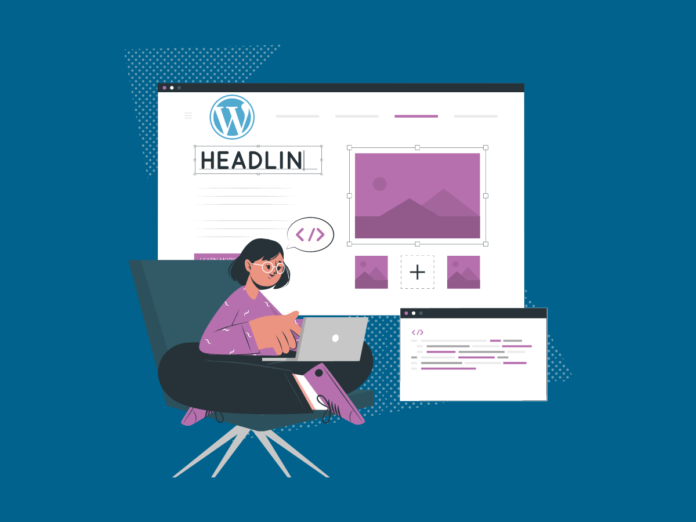If you’re considering taking your business or brand online or revamping your existing website, you’ve probably come across two popular options: WordPress and website builders. But which one is the best fit for your needs and is WordPress a website builder? In this article, we’ll delve into the world of website creation and explore the differences between WordPress and website builders. By the end, you’ll have a clearer picture of which option suits you best. Let’s dive in and find out if WordPress is indeed a website builder or if there are notable distinctions between the two.
Table of Contents
What Is WordPress?
First things first, let’s demystify WordPress. WordPress is an incredibly versatile and widely used content management system (CMS) that allows you to easily create and manage your website. According to W3Techs, WordPress powers over 43% of all websites on the internet. It started as a blogging platform in 2003 but has since evolved into a powerful tool for building all types of websites, from simple blogs to complex e-commerce sites. WordPress stands out because it is open-source, meaning it’s freely available to anyone and can be customised to suit your specific requirements.
What Is a Website Builder?
On the other hand, website builders are dedicated platforms that provide a simplified and user-friendly approach to website creation. These all-in-one tools typically offer drag-and-drop interfaces, pre-designed templates, and a range of features and functionalities to help you build your website without any coding knowledge. Website builders are designed to streamline the website development process and enable even beginners to create professional-looking sites with relative ease. Learn more website builders in our article on What Is a Website Builder.
WordPress vs. Website Builder: Understanding the Differences

Let’s dive into the details to understand the differences between WordPress and website builders. Here’s what you need to know:
- Flexibility and Control: WordPress, although not marketed as a website builder, offers extensive flexibility and control. It allows you to create a website tailored to your exact needs and preferences. With WordPress themes and plugins, you can customise every aspect of your site, from its design to its functionality. Website builders, like SitePad, Wix and Squarespace, are simpler to use but may have limitations in terms of customisation options.
- Learning Curve: When it comes to ease of use, website builders often take the lead. They provide intuitive interfaces, drag-and-drop functionality, and predefined templates that make building a website a breeze. On the other hand, WordPress has a steeper learning curve initially, but once you get the hang of it, you’ll have more power and flexibility at your fingertips.
- Scalability: If you’re looking to create a website with long-term growth in mind, WordPress is a great choice. It’s highly scalable and can handle websites of any size and complexity. Website builders, while suitable for small to medium-sized sites, may have limitations when it comes to scaling up to larger and more advanced websites.
- SEO Capabilities: WordPress is known for its strong SEO capabilities. With plugins like Yoast SEO, you can optimise your website’s content and meta tags to improve its visibility in search engines. Website builders also offer basic SEO features, but they may not provide the same level of control and advanced optimisation options as WordPress.
- Cost Considerations: WordPress itself is free to use, but you’ll need to invest in hosting and possibly premium plugins or themes. On the other hand, website builders often come with subscription plans that include hosting, support, and access to premium features. While website builders may have recurring costs, they can provide a more all-in-one solution for those who prefer convenience.
- Community Support: WordPress has a large and active community of users, developers, and resources. You can find countless tutorials, forums, and plugins created by the WordPress community. This robust support network ensures that you’ll always find help when you need it. Website builders also offer support, but they may not have the same extensive community as WordPress.
- Portability and Ownership: One advantage of using a WordPress is that you have the freedom to switch web hosts and take your website with you, ensuring you retain ownership and control over your content. With a website builder, everything is contained within their platform. This means that if you want to switch to a different platform (e.g. Wix to Squarespace) you might run into compatibility issues.
- E-commerce Functionality: Both WordPress and website builders offer e-commerce functionality. With its WooCommerce plugin, WordPress is a robust e-commerce solution that powers a significant percentage of online stores. Website builders also have built-in e-commerce capabilities, but they may have limitations in terms of customisation and advanced features compared to WordPress.
- Future Updates and Development: WordPress is an open-source platform, constantly evolving and improving with contributions from a global community. This means that updates, new features, and security enhancements are regularly released. Website builders, being proprietary tools, depend on the platform’s direction for future updates and developments.
With WordPress, you have the freedom to switch web hosts and take your website with you, ensuring you retain ownership and control over your content
When choosing between WordPress and a website builder, consider your specific needs, technical expertise, and long-term goals. If you’re a beginner or need a simple website, a website builder can provide an easier and more straightforward solution. However, if you require extensive personalisation, scalability, and control, WordPress is the tool for you. Remember, the right choice depends on your unique circumstances and preferences.
Ease of Use: Using WordPress or a Website Builder
When it comes to simplicity, website builders have the upper hand. They provide a beginner-friendly environment with intuitive interfaces for visual editing. This means you can simply select elements, drag them to your desired location, and voila, your website starts taking shape. Website builders offer a wide range of pre-designed templates, which you can customise to match your brand’s identity. Additionally, they often include built-in tools and features like image galleries, contact forms, and e-commerce functionality.
On the other hand, WordPress has a steeper learning curve. Although it offers a user-friendly interface, getting started is a bit more involved. You’ll need to install WordPress on your hosting account, choose and install themes, and familiarise yourself with the basic functionalities. However, once you get the hang of it, WordPress provides a highly customisable platform with endless possibilities. You can choose from thousands of free and premium themes and plugins that allow you to enhance your website’s functionality and add extra features.
Web Hosting Considerations for WordPress and Website Builders

Now, let’s talk about hosting. While website builders often come with integrated hosting, WordPress requires a separate hosting provider. This gives you the freedom to choose a hosting company that best suits your needs. At MCloud9, we pride ourselves on offering reliable and secure hosting plans that perfectly complement WordPress. All of our website builder packages come with hosting included and offer over 800 professional themes to get you started. If you’re considering WordPress, our WordPress hosting is optimised for WordPress, ensuring fast loading times and seamless performance.
By choosing a reputable hosting provider, you can maximise the potential of your WordPress website. Learn more about how WordPress hosting works and how it’s different to regular web hosting in our article on WordPress Hosting vs Web Hosting.
Choosing Between WordPress and a Website Builder
When it comes to choosing between WordPress and a website builder, there are a few factors to consider. If you’re looking for a quick and easy way to get your website up and running without any technical hassle, a website builder might be the right choice for you. They offer simplicity, speed, and a range of templates to choose from. However, keep in mind that website builders can’t match the flexibility and scalability of WordPress. WordPress is the way to go if you have more specific design or functionality requirements.
If you’re looking for a quick and easy way to get your website up and running without any technical hassle, a website builder might be the right choice for you
SEO Considerations: WordPress or Website Builder
Search engine optimisation (SEO) is crucial for improving your website’s visibility and driving organic traffic. WordPress shines in this aspect, thanks to its extensive plugin ecosystem. Plugins like Yoast SEO help you optimise your content, meta tags, and other crucial elements to improve your website’s search engine rankings. Additionally, WordPress offers clean code and responsive design options, both of which are vital for SEO success. While some website builders provide basic SEO features, they may not offer the same level of control and optimisation capabilities as WordPress.
FAQ for Is WordPress a Website Builder
Is WordPress a website builder?
Yes, WordPress can be considered a website builder, but it offers more advanced customisation options and flexibility compared to traditional drag-and-drop website builders. It’s an open-source platform that can be used to build any kind of website, from a simple blog to an eCommerce store. It’s free to use, but you’ll need web hosting, and the ability to install plugins and themes. You can also install various WordPress plugins that let you create your website with a few clicks.
Can I use WordPress or a website builder for my e-commerce store?
Both WordPress and website builders can be used for e-commerce websites. However, WordPress offers more extensive e-commerce capabilities through plugins like WooCommerce, making it a popular choice for online stores.
What’s the difference between WordPress and a website builder?
The battle between WordPress and website builders: The main difference is the level of personalisation available. While website builders are designed for simplicity, WordPress offers much more flexibility when it comes to design and features. With WordPress, you have access to thousands of paid and free themes and plugins that let you customise your site any way you like. On the other hand, website builders tend to be simpler and easier to use, but they don’t offer as many options for personalisation.
Should I use a website builder or WordPress?
That depends on what kind of website you’re looking to build. If you want something simple, then a website builder may be the better option for you since it’s easier to use and requires less technical knowledge. On the other hand, if you want more control over your site’s design and functionality, then WordPress is probably your best bet.
How do I build my website with WordPress?
Creating a new website with WordPress is easy once you get the hang of it. First, you’ll need web hosting and a domain name (which most hosting companies offer). If you’re not familiar with domain names and their significance, our comprehensive guide on What Is a Website Domain Name can provide you with useful information. Then, install WordPress on your host account using their one-click installation feature. Once installed, choose one of the thousands of free or paid themes available on the market today, then start adding content such as pages and posts using the built-in editor.
Do I need to learn coding for using WordPress?
In Conclusion
We’ve explored the battle between WordPress and website builders, and it’s clear that both have their merits. So, is WordPress a website builder? Well, it can be, but it’s much more than that. WordPress offers immense flexibility, personalisation options, and an extensive plugin ecosystem. It’s a powerful tool for building all types of websites, from blogs to e-commerce stores. On the other hand, website builders provide a beginner-friendly and streamlined approach to website creation. They offer simplicity, pre-designed templates, and drag-and-drop interfaces, making them perfect for those who want to build a website quickly and easily.
In the end, the choice between WordPress and a website builder depends on your specific needs and preferences. If you’re seeking simplicity and a quick start, a website builder may be the way to go. But if you’re looking for unlimited customisation options, scalability, and the ability to create any website you envision, WordPress is your best bet. Regardless of your choice, MCloud9 is here to support you with both a user-friendly website builder and optimised WordPress Hosting. Happy website building!


